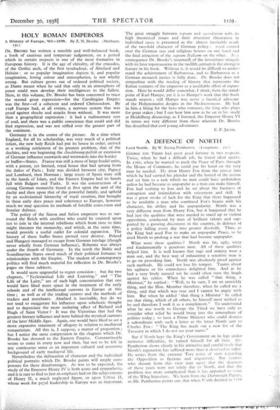HOLY ROMAN EMPERORS DR. BROOICE has written a sensible and
well-balanced book, a book of cautious and temperate judgement, on a period which in certain respects is one of the most formative in European history. It is the age of chivalry, of the crusades, of the Gothic arch, of the first troubadour, of Abailard and Heloise : or so popular imagination depicts it, and popular imagination, loving colour and atmospherics, is not wholly wrong. But culture grows out of ordered political society, as Dante meant when he said that only in an atmosphere of peace could men develop their intelligences to the fullest. Here, in this volume, Dr. Brooke has been concerned to trace the second great expression—for. the Carolingian Empire was the first—of a coherent and ordered Christendom. By 1198 Europe had, at all events, a nervous system that was proof against shocks and attacks from without. It was more than a geographical expression; it had a rudimentary sort of soul, and there was a public conscience that could and did find expression, and was not stifled over the greater part of the continent.
Germany is in the centre of the picture. At a time when England, for all its scholarship, was very much of a political infant, the new holy Reich had put its house in order, arrived at a working settlement of its greatest problem, that of the duchies, and was beginning the Ausdehnungspolitik or extension of German influence eastwards and westwards into the border or buffer—States. France was still a mass of large feudal units, with a potent, yet limited, royal house that had sprung from the dukes of Paris ; Italy was divided between city, Papacy and Lombard, then Norman ; large tracts of Spain were still in the hands of Islam, and the Eastern Empire had its hands full with Bulgars and Turks. It was the construction of a strong German monarchy based at first upon the unit of the duchy and then upon that of the powerful family, and upheld by an ecclesiastical hierarchy of royal creation, that brought in these early days peace and coherence to Europe, however much we may question its methods of forcible convtrsion and frontier defence.
The policy of the Saxon and Salian emperors was to sur- round the Reich with satellites who could be counted upon not to join in the internal rebellions which from time to time might threaten the monarchy, and which, at the same time, would provide a useful outlet for colonial expansion. The history of these buffer States proved very diverse. Poland and Hungary managed to escape from German tutelage (though never wholly from German influence), Bohemia was always under the thumb of Germany. In the north the Baltic and Scandinavian States owed much of their political fortunes to relationships with the Empire. The student of contemporary politics will find much material for reflection in Dr. Brooke's pages on these subjects.
It would seem ungrateful to regret concision : but the two chapters, "Ecclesiastical Life and Learning," and "The Life of the Laity," are of such high concentration that one would have liked more space in the treatment of the early schools and of the intellectual currents in Europe at this time ; as well as of the trading centres and the methods of traders and merchants. Abailard is inevitable, but do we not tend to exaggerate his influence upon scholastic thought and to depreciate the more enduring effect of Richard and Hugh of Saint Victor ? It was the Victorines that had the greatest literary influence and were behind the mystical currents of the later Middle Ages. Again, one would have liked to see a more expansive treatment of allegory in relation to mediaeval romanticism. All this is, I suppose, a matter of proportion ; but I notice the same compression in the chapters which Dr. Brooke has devoted to the Eastern Empire. Constantinople seems to come in every now and then, but not to be felt in any continuous sense as an important cultural and economic background of early mediaeval life. Nevertheless the delineation of character and the individual political portraits which Dr. Brooke paints will amply com- pensate for these disadvantages. As was to be expected, the study of the Emperor Henry IV is both acute and sympathetic, and it is rare to find so just an emphasis laid on the achievements of Henry II, a much neglected figure, or upon Urban II, whose work for papal leadership in Europe was so important.
The great struggle between regnum and sacerdotimn with its high theoretical issues and their abundant illustration in individual cases is presented as the almost inevitable result of the two-fold character of German policy : royal control over the German sees and religious houses on one hand and the fatal attraction of the regnum Itah'cum on the other. As a consequence Dr. Brooke's treatmerft of the investiture struggle with its later repercussions in the twelfth century is the strongest feature in his book. Without it, it would be difficult to under- stand the achievement of Barbarossa, and to Barbarossa as a German monarch justice is fully done. Dr. Brooke does not sympathise with the reading of history that represents the Italian ventures of the emperors as a justifiable effort of expan- sion. Here he would differ somewhat, I think, from the stand- point of Karl Hampe, yet it is to Hampe's work that this book stands nearest ; still Hampc was never a fanatical advocate of the Hohenstaufen designs in the Mediterranean. He had in him a liking for the hero who ventures, the king who plays for great stakes ; but I can hear him now as he sat in his study at Heidelberg discussing, as I listened, the Emperor Henry VI in terms not very different from those wherein Dr. Brooke has described that cool young adventurer.
E. F. JACOB.


































 Previous page
Previous page